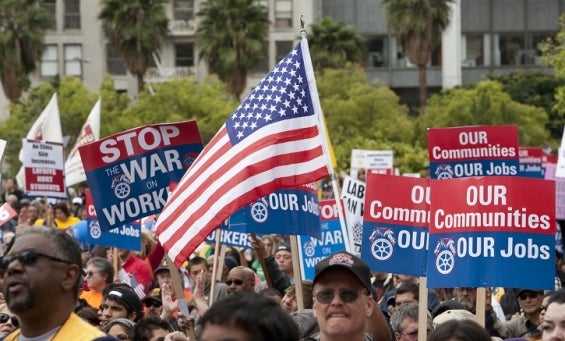Headline News
Workers Hold The Future Of Inequality In Their Hands

Editor’s note: This is the final of five Teamster In Depth blog postings leading up to the Nov. 4 election that examine issues of importance not only to Teamsters, but all workers. It is because of these matters that it is imperative for hardworking Americans to educate themselves and vote for pro-worker candidates this fall. Learn more about voter suppression, the gender wage gap, corporate welfare and unfair trade policies in previous election-related blogs.
Our nation’s economic recovery may seem real to those who compile government statistics or for the elites on Wall Street and Capitol Hill. But ask the average rank-and-file worker in cities and towns across America, and you’ll likely get a much different answer.
Despite a reduction in the U.S. unemployment rate, workers are still struggling. The reason is simple – jobs that paid a fair salary and supported families before the Great Recession have been replaced by those that pay the minimum wage or not much higher. In many cases, people need to work multiple jobs to make ends meet. Otherwise, they make do with less or with government assistance.
As a result, the U.S. is experiencing a significant income inequality problem. A new report released this month by the National Bureau of Economic Research found that wealth inequality has soared in the last three decades, with the top 0.1 percent share of wealth growing from seven percent in 1978 to 22 percent in 2013.
“Wealth inequality is making a comeback, with the top 0.1% wealth share almost as high in 2012 as in the 1916 and 1929 peaks and three times higher than in the late 1970s,” authors Emmanuel Saez and Gabriel Zucman wrote. “The key driver of the rapid increase in wealth at the top is a surge in the share of income, in particular labor income, earned by top wealth holders.”
Of course, one way to counteract the growing wage disparity would be to raise the federal minimum wage, which has been stuck at $7.25 an hour for more than five years. Democrats have largely led the charge to do so, but the idea is not without Republican support. In fact, four former House GOP members called for a hike in the nation’s hourly salary floor earlier this month.
“It’s wrong that someone in the United States of America who works hard for long hours to support their family can still be stuck in poverty today,” the ex-lawmakers wrote in a USA Today column. “It is time for Congress to give the working poor a raise and take the politics out of this issue by linking future increases in the minimum wage to the cost of living.”
Unfortunately, not enough Republicans in Congress are listening to that message. And the same is true in many states across the nation. The administration of Gov. Scott Walker (R-Wisc.) rebuffed calls to raise the minimum wage above the federal standard earlier this month. But perhaps more insulting was its suggestion that $7.25 an hour is a living wage in the state, despite studies the cost of living is actually almost three times higher.
It is nothing short of an abomination that hardworking Americans find themselves in these straits. Low-wage workers have repeatedly taken to the streets to raise public awareness about income inequality, but have little to show for it at the national level.
But that could change if workers take advantage of the system the U.S. does have in place. In many states, they can vote right now for pro-worker candidates who understand the problem and are willing to put people before the powerful. Or they can head to the voting booth next week and do the same.
Either way, this is the opportunity before us. By voting, we can effect change. Not showing up is not an option – at least if working people really want policies to change. Don’t miss out on helping to shape a better future for yourself and your family. Vote on Nov. 4.